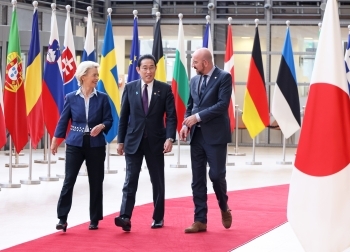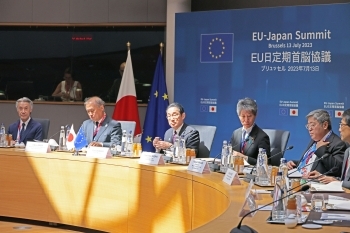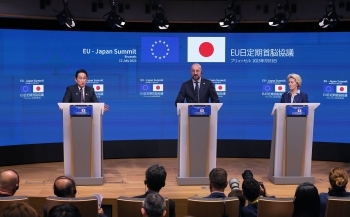Japan-EU Relations
The 29th Japan-EU Summit Meeting
 Prime Minister Kishida receiving greetings from
Prime Minister Kishida receiving greetings from President Charles Michel of the European Council and President Ursula von der Leyen of the European Commission (Photo: Cabinet Public Affairs Office)
 Working lunch
(Photo: Cabinet Public Affairs Office)
Working lunch
(Photo: Cabinet Public Affairs Office)
 joint press conference
(Photo: Cabinet Public Affairs Office)
joint press conference
(Photo: Cabinet Public Affairs Office)
On July 13, commencing at 12:00 noon for approximately 100 minutes, Prime Minister KISHIDA Fumio, during his visit to Brussels, Belgium, held a working lunch and the 29th Japan-EU Summit Meeting with H.E. Mr. Charles Michel, President of the European Council and H.E. Dr. Ursula von der Leyen, President of the European Commission, followed by a joint press conference. A summary is given below. The
Joint Statement (PDF) was issued on the occasion of the Summit.
was issued on the occasion of the Summit.
1. Opening remarks
President Michel expressed his appreciation for the success of the G7 Hiroshima Summit in May and his gratitude for hospitality, and emphasized the importance of the Japan-EU relations. In response, Prime Minister KISHIDA stated that, as the international community faces a historic turning point, it is becoming increasingly important for like-minded partners who share values and principles to work together beyond regional boundaries, and that the recent G7 Hiroshima Summit, with the cooperation of President Michel and President von der Leyen, could demonstrate the unwavering unity of the G7. He also confirmed the close collaboration between Japan and the EU to maintain and strengthen a free and open international order based on the rule of law, and expressed his desire to deepen discussions on concrete measures for cooperation.
Prime Minister KISHIDA also highly valued and welcomed EU's decision on lifting of the import restriction measures on Japanese food products taken in the aftermath of the Great East Japan Earthquake, as a major boost to the reconstruction of the affected areas.
2. Japan-EU Relations
- Prime Minister KISHIDA stated that cooperation in joint exersice and capacity building support in the field of maritime security and safety has made progress and that he welcomed the announcement of the launch of a new strategic dialogue to take such cooperation in the security field to a new level. The EU agreeed on the importance of strengthening security cooperation with Japan.
- Regarding economic security, Prime Minister KISHIDA stated that it was meaningful that the G7 leaders at the G7 Hiroshima Summit issued the first G7 Leaders’ Statement on Economic Resilience and Economic Security and sent a comprehensive and conrecte message. He also expressed his high appreciation for the EU's new economic security strategy, which is in line with Japan's efforts.
- Both sides welcomed the holding of the Council by relevant ministers on July 3, based on the Digital Partnership launched at last year's Japan-EU Summit Meeting. Both sides confirmed they would further promote cooperation in the digital field.
- On connectivity, Prime Minister KISHIDA stated that Japan and the EU will work together to improve connectivity through the development of high-quality infrastructure, and expressed his desire to continue working together under the Japan-EU Partnership for Connectivity.
- On Japan-EU energy cooperation, both sides confirmed the need for cooperation in the areas of energy conservation, renewable energy, and hydrogen, as well as battery and critical mineral supply chain resiliency, and confirmed that variouspathways will lead to the common goal of net-zero by 2050.
- In particular, they concurred that in order to strengthen cooperation in the field of hydrogen between Japan and the EU, Japan and the EU will set up a cooperation framework with the involvement of leaders, and strengthen cooperation on the expansion of the hydrogen market.
3. Global Issues
- Regarding nuclear disarmament and non-proliferation, Prime Minister KISHIDA stated that it was significant that the G7 leaders were able to demonstrate to the international community at the G7 Hiroshima Summit their pledge for peace and their determination to realize a "world without nuclear weapons" in Hiroshima, a city devastated by a nuclear weapon.
- In addition, both sides exchanged views on food security, health, and other issues and concurred to strengthen cooperation between Japan and the EU. In particular, recognizing the importance of the Black Sea Grains Initiative in ensuring global food security, both sides concurred to work together with the international community to request Russia to steadily implement and continue the initiative.
- Furthermore, given that the rapid development and spread of artificial intelligence (AI), especially generative AI, is an important issue between Japan and the EU, as well as for the international community as a whole, Prime Minister KISHIDA conveyed his decision to hold a G7 Leaders’ Video Conference in this fall with generative AI as central agenda.
4. Regional Situation
- With regard to China, both sides confirmed that it is important to directly express common concerns, call for action as a responsible member of the international community, while cooperating with China on global issues such as climate change and areas of common interest, and build constructive and stable relations through dialogue.
- Regarding the situation in North Korea, both sides shared serious concerns about North Korea's intensified nuclear and missile activities including the ICBM-class ballistic missile launch on July 12 and confirmed that they will continue to work closely together in dealing with North Korea, including on the abductions issue.
- With regard to the response to Russia's aggression against Ukraine, both sides reaffirmed the need to continue severe sanctions against Russia and strong support for Ukraine, and maintain the unity among the like-minded countries.

